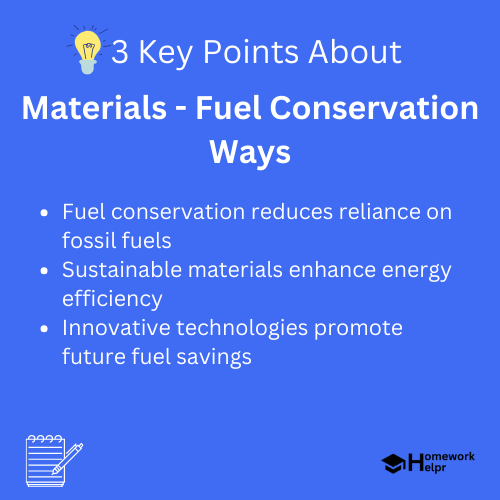📝 Summary
Fuel conservation is essential in addressing global energy challenges. Efficient usage of energy can significantly reduce reliance on fossil fuels. Understanding the materials we use is pivotal; opting for sustainable and renewable materials can help protect resources. Key strategies include utilizing energy-efficient appliances, carpooling, and maintaining vehicles, all contributing to significant fuel savings. Overcoming challenges, such as resistance to change and higher initial costs, is crucial. As technology advances, innovative materials like biofuels and 3D-printed options offer promising solutions for future fuel conservation efforts.
Materials and Fuel Conservation Ways
Fuel conservation has become a pressing issue in today’s world. Increasing global temperatures and energy consumption compel us to rethink our energy strategies. The need for efficient energy usage drives innovations and practices that can significantly reduce our reliance on fossil fuels.
One of the first steps towards fuel conservation involves understanding the various materials we use in our daily lives. These materials can be made with different levels of sustainability and environmental impact. By selecting the right materials, we can not only conserve fuel but also protect our precious resources.
Understanding Fuel Conservation
Fuel conservation refers to the practices and strategies that aim to reduce the amount of fossil fuels consumed. These practices can range from small individual actions to larger community efforts. The goal is to enhance the efficiency of energy use, reduce pollution, and limit the depletion of natural resources.
Fuel conservation is crucial for several reasons. First, decreasing our dependence on fossil fuels helps combat climate change. Secondly, it contributes to economic savings for households and organizations. Lastly, fuel conservation promotes energy independence, allowing nations to rely less on external fuel sources.
Types of Materials Impacting Fuel Consumption
The materials we choose can have a significant effect on fuel conservation. Here are some of the critical categories of materials:
- Renewable materials like wood, bamboo, and cork can be more sustainable choices.
- Recyclable materials such as glass and metals can reduce the need for new materials, thereby saving the energy required to extract and process them.
- Sustainable composites that combine various materials can offer enhanced strength while using less fuel to manufacture.
- Insulating materials in construction can minimize energy consumption for heating and cooling, further conserving fuel.
❓Did You Know?
Did you know that by using recycled materials, we can save enough energy to power a home for six months?
Strategies for Fuel Conservation
There are numerous methods and strategies we can employ to conserve fuel. Some practical ways include:
- Using energy-efficient appliances that consume less power.
- Carpooling which reduces the number of vehicles on the road and lowers individual fuel consumption.
- Regular vehicle maintenance to improve fuel efficiency.
- Adopting alternative transportation methods, such as biking, walking, or using public transit.
Implementing these strategies can lead to significant fuel savings. For example, energy-efficient appliances can reduce energy consumption by up to 50%. Carpooling can save an average of 1.5 gallons of fuel per week per person. Regular vehicle maintenance can improve fuel efficiency by 4%.
Examples
Example: A family that decides to switch to energy-efficient LED lighting can save approximately $225 per year on energy costs, contributing to fuel conservation.
Innovative Materials for Fuel Conservation
Research and technology are advancing in the field of materials, leading the way for new innovations that help conserve fuel. Some notable materials include:
- Biofuels derived from organic materials that can reduce reliance on petrol.
- 3D printed materials that minimize waste and allow for more efficient designs.
- Insulation materials that enhance thermal performance and reduce energy requirements for heating.
Some biofuel examples include biodiesel made from vegetable oils and bioethanol produced from fermentation. Both are effective substitutes for traditional fossil fuels, thereby promoting fuel conservation.
Challenges in Fuel Conservation
While fuel conservation presents numerous benefits, it also comes with its own set of challenges. Key challenges include:
- Resistance to change among people and organizations who are used to conventional methods.
- Higher upfront costs associated with purchasing energy-efficient products and technologies.
- Lack of awareness regarding the importance of fuel conservation methods.
Educating individuals and organizations about the long-term economic and environmental benefits can help overcome these barriers. For instance, though upfront costs for energy-efficient products may be higher, the long-term savings can be substantial.
Definition
1. Renewable: A natural resource that can be replenished naturally, such as solar or wind energy. 2. Composites: Materials made from two or more constituent materials with significantly different physical or chemical properties that remain separate and distinct at the macroscopic or microscopic scale.
Future of Fuel Conservation
The future of fuel conservation is promising, with ongoing advancements in materials and technologies. Innovations in sustainable materials, like biodegradable plastics and solar panels, are paving the way for a more energy-efficient society.
Emerging technologies like electric and hydrogen-powered vehicles herald a new era of transportation with minimal fuel consumption. Furthermore, pursuing alternative energy sources such as wind and solar continues to grow, helping to reduce our reliance on fossil fuels.
Conclusion
Fuel conservation is not just a trend but a necessity in our modern world. By understanding the impact of materials, employing practical strategies, and embracing innovative technologies, we can work towards a sustainable future. As individuals, we have the power to make choices that conserve fuel and protect our environment for generations to come. Let us all take part in this vital effort and be champions for the planet!

Related Questions on Materials – Fuel Conservation Ways
What is fuel conservation?
Answer: Fuel conservation refers to practices that reduce fossil fuel consumption.
How do materials impact fuel conservation?
Answer: Choosing sustainable materials can significantly reduce energy usage.
What are practical strategies for fuel conservation?
Answer: Using energy-efficient appliances and carpooling are effective strategies.
What challenges exist in fuel conservation?
Answer: Resistance to change and higher upfront costs can hinder conservation efforts.
